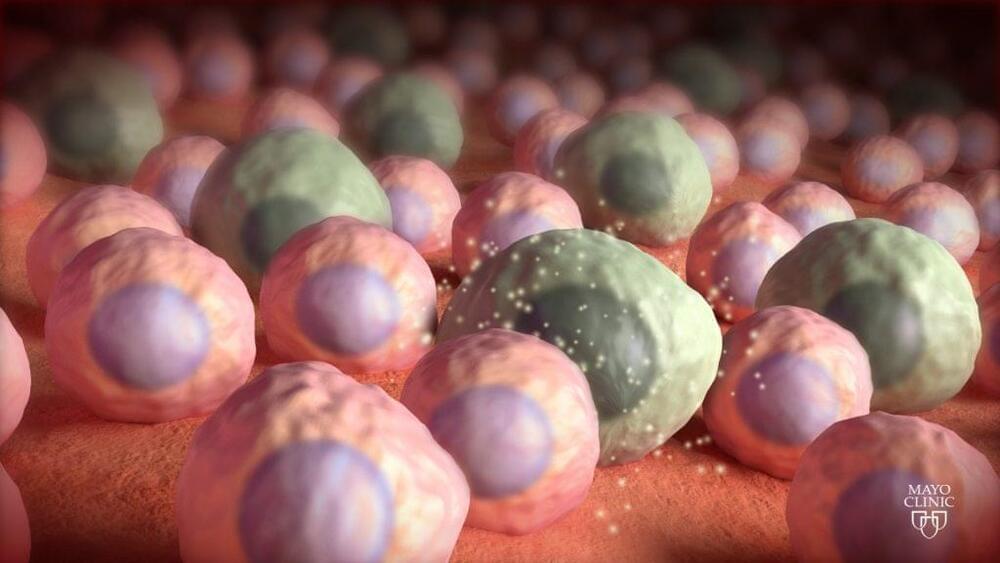Centenarians share their best advice for living to 100 years old.


Use code coolworlds at https://incogni.com/coolworlds to get an exclusive 60% off an annual Incogni plan. The idea of Dyson Spheres was a radical proposal by the physicist Freeman Dyson, an enormous shell of material enveloping a star. Dyson’s idea may be over half a century old, but interest in looking for such objects has only grown in the decades since. But how would such structures work? Are they physically even possible? And what might someone use them for? Today, we dive into the physics of Dyson spheres. Written & presented by Prof. David Kipping. Edited by Jorge Casas. Special thanks to Jason Wright for fact checking. → Support our research: https://www.coolworldslab.com/support → Get merch: https://teespring.com/stores/cool-wor… Check out our podcast: / @coolworldspodcast THANK-YOU to T. Widdowson, D. Smith, L. Sanborn, C. Bottaccini, D. Daughaday, S. Brownlee, E. West, T. Zajonc, A. De Vaal, M. Elliott, B. Daniluk, S. Vystoropskyi, S. Lee, Z. Danielson, C. Fitzgerald, C. Souter, M. Gillette, T. Jeffcoat, J. Rockett, D. Murphree, M. Sanford, T. Donkin, A. Schoen, K. Dabrowski, R. Ramezankhani, J. Armstrong, S. Marks, B. Smith, J. Kruger, S. Applegate, E. Zahnle, N. Gebben, J. Bergman, C. Macdonald, M. Hedlund, P. Kaup, W. Evans, N. Corwin, K. Howard, L. Deacon, G. Metts, R. Provost, G. Fullwood, N. De Haan, R. Williams, E. Garland, R. Lovely, A. Cornejo, D. Compos, F. Demopoulos, G. Bylinsky, J. Werner, S. Thayer, T. Edris, F. Blood, M. O’Brien, D. Lee, J. Sargent, M. Czirr, F. Krotzer, I. Williams, J. Sattler, B. Reese, O. Shabtay, X. Yao, S. Saverys, A. Nimmerjahn, C. Seay, D. Johnson, L. Cunningham, M. Morrow, M. Campbell, B. Devermont, Y. Muheim, A. Stark, C. Caminero, P. Borisoff, A. Donovan & H. Schiff. REFERENCES ► Wright, J. 2020, “Dyson Spheres”, Serbian Astronomical Journal, 200, 1: https://arxiv.org/abs/2006.16734 ► Dyson, F. 1960, “Search for Artificial Stellar Sources of Infrared Radiation”, Science, 131, 1667: https://ui.adsabs.harvard.edu/abs/196… ► Dyson, F. 1960, Science, 132,250 ► NASA IRB JWST Report 2018: https://www.nasa.gov/wp-content/uploa… ► Papagiannis, M. D. 1985, “SETI — a look into the future.”, The search for extraterrestrial life: recent development, 543: https://ui.adsabs.harvard.edu/abs/198… ► Scoggins, M. & Kipping, D. 2023, “Lazarus stars: numerical investigations of stellar evolution with star-lifting as a life extension strategy”, MNRAS, 523, 3251: https://arxiv.org/abs/2210.02338 MUSIC Licensed by SoundStripe.com (SS) [shorturl.at/ptBHI], Artlist.io, via CC Attribution License (https://creativecommons.org/licenses/…) or with permission from the artist. 0:34 Tamuz Dekel — Quiet Pull 3:05 We Dream of Eden — Discovery 4:23 Hill — World of Wonder [https://open.spotify.com/track/7kYX7G… ] 6:28 Chris Zabriskie — Music from Neptune Flux 4 8:59 Hill — Arctic Warmth 11:54 Hill — Northern Borders 15:13 Hill — Fragile 17:45 Indive — Trace Correction CHAPTERS 0:00 Prologue 0:39 Inception 3:11 Incogni 4:27 Mechanical Stability 8:31 Gravitational Stability 11:08 Stellar Feedback 13:42 Computational Limits 16:23 Rings and Swarms 17:45 Outro and Credits #DysonSphere #Astronomy #CoolWorlds

I like what Fahy says here most.
RAADfest is the largest and most immersive event in the world focused on super-longevity for a general audience. Bringing together cutting-edge science, inspiration, entertainment and fun, RAADfest is more than just a conference – it’s a celebration of life. From brain longevity and sexual health, to senolytics, personalized medicine and helping your pets live longer too, RAADfest provides the information and inspiration to enable people to take charge of their longevity.
For more info, visit: https://www.raadfest.com/
Produced by the Coalition for Radical Life Extension, RAADfest also includes RAADcity, the international product expo. RAADcity features leading brands sharing demos and deals on their longevity products and services with the people who want and need them the most.
When: Sept 5th to 8th, 2024

I have a new essay out via the wonderful site Merion West. The article is based on some of my experimental writings at Oxford. I hope you’ll read and consider it. I’m highly worried life extension science isn’t moving forward fast enough!
“Sadly, biological humans are likely to be mortal for centuries more, unless a dramatic increase of both resources and life extension scientists are marshaled.”
Certain well-known gerontologists and longevity experts around the world believe that sometime in this century—probably in the next 15–50 years—medicine will likely overcome and cure most forms of disease, and even death itself. Billionaires such as Meta’s Mark Zuckerberg, Amazon’s Jeff Bezos, Alphabet’s Larry Page, and Oracle’s Larry Ellison have jumped on board, pledging billions of dollars to “conquering all disease by this century” and mortality altogether.
These business titans hope age reversal techniques via genetic editing therapies, stem cell rejuvenation, 3D bioprinting of organs, and the widespread creation of synthetic organs like artificial hearts could keep people indefinitely young and healthy. If biological human death from disease and aging are overcome, then only catastrophic accidental death—such as an airplane crash or incineration—can kill people. (Accidental death in this vein accounts for about seven percent of all deaths in the United States.)
Transhumanists believe that the human being is like a machine—an entity that can be fixed and made to overcome nearly all biological death. The question is how fast can this be done? If the human being is indeed a machine-like entity as nearly all credible scientists propose, then the answer almost certainly rests not in the limits of biology but, rather, in the amount of work and resources put into the life extension field.
Join us on Patreon! https://www.patreon.com/MichaelLustgartenPhDDiscount Links/Affiliates: Blood testing (where I get my labs): https://www.ultalabtests.com/.…
#eyehealth #aging #antiaging #cellularpathology #MacularDegeneration #AgeRelatedMacularDegeneration #retina #eyehealth #lysosomedysfunction #drusendeposits #stemcells #research
A team of researchers reveals the cellular pathology of “dry” age-related macular degeneration (AMD); discovering the potential source of dysfunction in the process whereby cells in the retina remove waste.
What
The team from NIH and Johns Hopkins University, Baltimore, reported the details of how alterations in a factor called AKT2 affect the function of lysosome organelles, and results in the production of drusen deposits in the retina, which is a hallmark sign of dry age-related macular degeneration. The researchers suggest that the findings of drusen formation are a downstream effect of AKT2-related lysosome dysfunction and could point to a new target for therapeutic intervention.

Aging is a universal experience, evident through changes like wrinkles and graying hair. However, aging goes beyond the surface; it begins within our cells. Over time, our cells gradually lose their ability to perform essential functions, leading to a decline that affects every part of our bodies, from our cognitive abilities to our immune health.
To understand how cellular changes lead to age-related disorders, Calico scientists are using advanced RNA sequencing to map molecular changes in individual cells over time in the roundworm, C. elegans. Much like mapping networks of roads and landscapes, we’re charting the complexities of our biology. These atlases uncover cell characteristics, functions, and interactions, providing deeper insights into how our bodies age.
In the early 1990s, Cynthia Kenyon, Vice President of Aging Research at Calico, and her former team at UCSF discovered genes in C. elegans that control lifespan; these genes, which influence IGF1 signaling, function similarly to extend lifespan in many other organisms, including mammals. The genetic similarities between this tiny worm and more complex animals make it a useful model for studying the aging process. In work published in Cell Reports last year, our researchers created a detailed map of gene activity in every cell of the body of C. elegans throughout its development, providing a comprehensive blueprint of its cellular diversity and functions. They found that aging is an organized process, not merely random deterioration. Each cell type follows its own aging path, with many activating cell-specific protective gene expression pathways, and with some cell types aging faster than others. Even within the same cell type, the rate of aging can vary.

Drugs that selectively kill senescent cells may benefit otherwise healthy older women but are not a “one-size-fits-all” remedy, Mayo Clinic researchers have found. Specifically, these drugs may only benefit people with a high number of senescent cells, according to findings publishing July 2 in Nature Medicine.
Senescent cells are malfunctioning cells in the body that lapse into a state of dormancy. These cells, also known as “zombie cells,” can’t divide but can drive chronic inflammation and tissue dysfunction linked to aging and chronic diseases. Senolytic drugs clear tissues of senescent cells.
In the 20-week, phase 2 randomized controlled trial, 60 healthy women past menopause intermittently received a senolytic combination composed of FDA-approved dasatinib and quercetin, a natural product found in some foods. It is the first randomized controlled trial of intermittent senolytic treatment in healthy aging women, and the investigators used bone metabolism as a marker for efficacy.